Agricultural Products
-
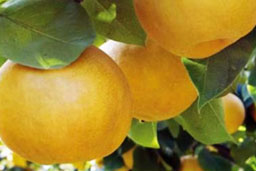 Cheonan Singo Pear
Cheonan Singo PearCheonan Singo pear is produced in a hilly area with the ideal climatic conditions, and in fertile and well-drained soil. They are brightly yellow, and have juicy flesh and a sweet and refreshing flavor. They are exported worldwide including the U.S., Australia and Southeast Asia.
-
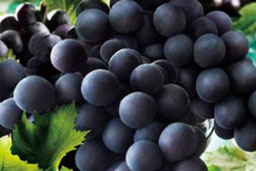 Cheonan Geobong Grape
Cheonan Geobong GrapeCheonan Geobong grapes are grown using eco-friendly farming techniques in a vast hillary area. The grapes are plump with high sugar content, and they are also rich in various nutrients. Cheonan Geobong Grapes, accounting for 43% of the total national production of Geobong grapes, were awarded the top prize at the National Grape Fair for 3 consecutive years.
-
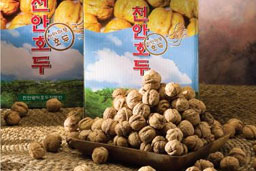 Cheonan Gwangdeok Walnut
Cheonan Gwangdeok WalnutThere is a walnut farm in Gwangdeoksan Mountain that accounts for half of the national walnut production in Korea. Cheonan walnuts, grown in the clean zone of Gwangdeoksan Mountain, have thin shells and are high-protein, low-calorie well-being food that is rich in minerals and vitamins.
-
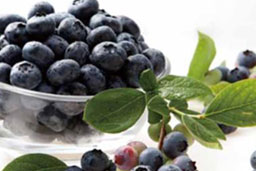 Blueberry
BlueberryCheonan blueberries are cultivated without the use of pesticides. Anthocyanin found in blueberries is known to enhance eyesight, reduce blood cholesterol, and have anti-aging effects.
-
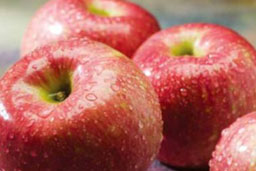 Cheonan Apple
Cheonan AppleCheonan apples, grown under ideal climatic conditions and in fertile soil, has a high vitamin C and inorganic salt content. It is scarlet in color and has a sweet flavor thanks to its high sugar content.
-
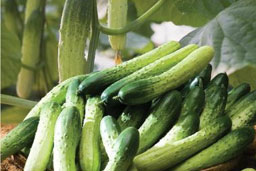 Cheonan Cucumber
Cheonan CucumberCheonan cucumbers are grown inside greenhouses that are strictly managed. They are alkaline food products that are rich in vitamins and minerals such as potassium, phosphorus and iron. They are known for their excellent flavor and smell, and their freshness can be maintained for a prolonged period of time. They are also used in skin care.
-
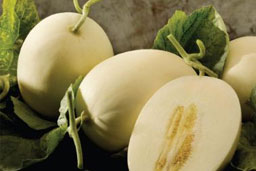 Susin Melon
Susin MelonSusin melons, grown in local soil, have a high sugar content and are rich in iron, niacin, vitamins A and C. Also, they are widely loved by consumers for their unique flavor and smell.
-
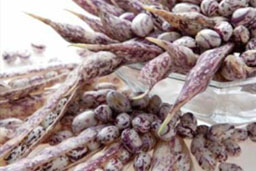 Horangineongkul Beans
Horangineongkul BeansThese beans are primarily produced in Gwangdeok, a clean zone of Cheonan. They are larger than general types of beans, and are rich in nutrients including proteins, carbohydrates, and vitamins C and A. These savory beans make great snacks for children.
-
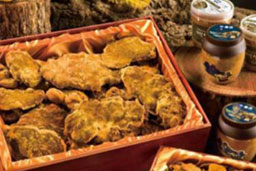 Awi and Sanghwang Mushroom
Awi and Sanghwang MushroomAwi mushrooms, cultivated as a new variety by an agricutlral firm called Tteurachae, are receiving a favorable response from consumers with their sweet flavor, pleasant smell and tender flesh. Sanghwang mushrooms (Phellinus linteus) produced by an agricultural association corporation called Charyeongnongsan has excellent anti-cancer effects. They are sold in powder form and are used to make makgeolli (rice wine) and medicinal liquor.
-
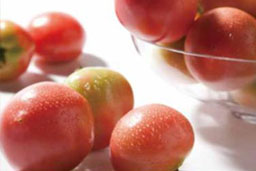 Eco-friendly Tomato
Eco-friendly TomatoTomatoes grown in Cheonan are cultivated using eco-friendly farming techniques. Fully matured tomatoes and cherry tomatoes are produced here.
-
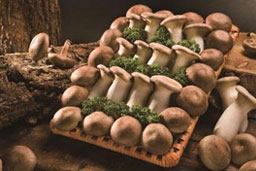 Cheonan Mushroom
Cheonan MushroomCheonan mushrooms, known for their superb color and shine, tender yet firm flesh and pleasant smell, are grown in the clean zones of Gwangdeoksan, Hokseongsan and Wiryesan mountains. They are mainly exported to Japan, and the ISO 9001 Quality Certification (Quality Management System) was acquired for their production in 2006.











